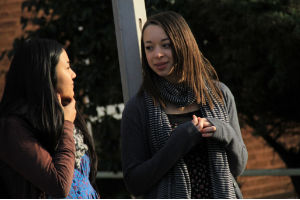
Mentors - Every young person should have one
This is why it is crucial to empower people within the faith community to act as mentors and role models to young people, to help them sort through all these messages and to look at the world from a broader perspective. At the same time, it is important to help young people identify role models within their faith community. If there is no one they respect in their faith community, they will turn to someone or something else for guidance and leading.

What Are Mentors?
Mentors are people who are able to spend time listening to others, maybe giving advice or help, but whose main function is to be a positive role model.
Mentors can be a very positive influence on a young person’s life, someone that the young person respects and trusts. One professional mentor says, “Mentoring is to support and encourage people to…become the person they want to be.”[1] In faith communities in particular, a mentor can act as a spiritual guide, helping young people understand how to live in and interact with this world as a person of faith.
Sometimes it is difficult for young people to enter into mentoring relationships within a faith community, because they feel like they may be stereotyped or judged. One young person mentioned that a “role model…not only treats me as an equal but is honest, trusting, and, most of all, open-minded.”[2] Unfortunately, many young people simply do not see other members of the faith community as open-minded and can feel nervous about being completely vulnerable and honest with them. As a result, a young person may feel more comfortable talking with a mentor outside of his or her family or faith community.
For Parents
For parents, it may feel strange that your child is talking to someone else about things they feel they can't talk to you about. Some young people talk to their parents about everything, but many young people feel more comfortable opening up to someone outside of the family because they may have a different perspective. Confident parents will understand this need and find "important others" who they know could act as good mentors and role models for their child, offering a caring ear and wise counsel.

If spiritual mentoring is done well, it can give young people the faith support they need to make good decisions as they face the many influences of this world. At the same time, it is important to remember that everyone, even mentors and faith leaders, is on their own personal journey, and the mentor often gains and learns just as much from a mentoring relationship as the young person does.

What does mentoring look like?
Mentoring will look different for every pair of individuals, based on their needs, interests, and commonalities. One young person may need academic mentoring or career advice, while another young person may need emotional support or spiritual guidance. One young person may be more comfortable talking extensively about themselves and their issues initially, while another young person may be defensive or afraid of such vulnerability at first. One young person and his/her mentor may connect better over a cup of tea or a meal, while another pair may connect better playing a game of football, a video game or a trip to the shops.
Remember that relationships and trust take time. Even when it seems as though no progress is being made, sometimes it is enough to simply show up, be consistent, and let young people know that you are available.
The Statistics
Sometimes it can feel emotionally exhausting to invest in people, but statistics have shown that mentoring really does change lives. Of the 959 boys and girls in one study, 60% were boys, 60% were from a minority group, and 80% lived in low-income housing. 487 of the participants were matched with mentors for 18 months, while the remaining 472 were not. The results of the study revealed that the participants with mentors were:
- 46 % less likely to use illegal drugs
- 27% less likely to use alcohol
- 37% less likely to skip class
- 53% less likely to skip school
- 33% less likely to hit someone [3]
Another study discovered that students with mentors were more likely to complete sixth-form, attend university, not get arrested, live without the need for state benefits, get involved with community service, and be hopeful about their future.[4]
All of these statistics reveal that a committed mentor can dramatically affect a young person’s life in a positive way, enabling him or her to reach their full potential. Within a faith community a mentor can help young people be the best they can be—can enable them to take ownership of their faith, to help them discover why they believe what they believe, and to see how their faith can inform every decision they make in their lives.
